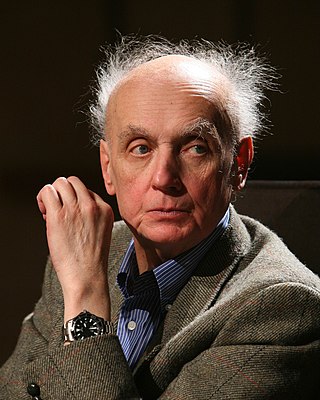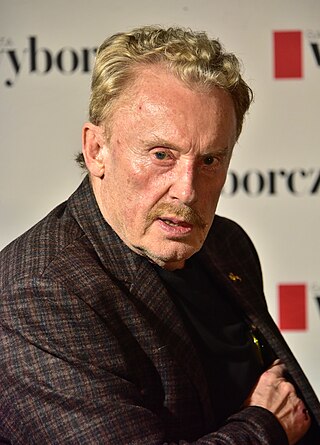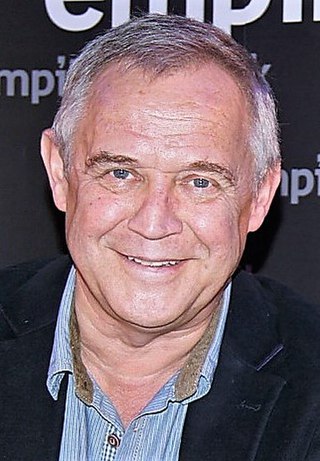Related Research Articles

Wojciech Kilar was a Polish classical and film music composer. One of his greatest successes came with his score to Francis Ford Coppola's Bram Stoker's Dracula in 1992, which received the ASCAP Award and the nomination for the Saturn Award for Best Music. In 2003, he won the César Award for Best Film Music written for The Pianist, for which he also received a BAFTA nomination.

Maximilian Kolbe was a Polish Catholic priest and Conventual Franciscan friar who volunteered to die in place of a man named Franciszek Gajowniczek in the German death camp of Auschwitz, located in German-occupied Poland during World War II. He had been active in promoting the veneration of the Immaculate Virgin Mary, founding and supervising the monastery of Niepokalanów near Warsaw, operating an amateur-radio station (SP3RN), and founding or running several other organizations and publications.

GKS Katowice is a Polish professional football club based in Katowice. They currently compete in the Ekstraklasa in the 2024–25 season after gaining promotion from the I liga in 2024.

Daniel Marcel Olbrychski is a Polish film and theatre actor who is widely considered one of the greatest Polish actors of his generation. He appeared in 180 films and TV productions and is best known for leading roles in several Andrzej Wajda movies including The Promised Land and also known for playing a defector and spymaster Vassily Orlov alongside Hollywood actress Angelina Jolie in the movie Salt.

Jan Ladislav Rubeš CM was a Czech-Canadian bass opera singer and actor.

Leon Stanisław Niemczyk was a Polish actor.

Marek Tadeusz Kondrat is a former Polish TV, film and theatrical actor, director.

Krzysztof Zaleski was a Polish theater director and cinema actor.

Maciej Kozlowski was a Polish actor, mostly known for his roles in Kingsajz, Psy, Kiler, With Fire and Sword and Schindler's List and the TV series M jak miłość.

Artur Barciś is a Polish actor and film director. His television appearances include Krzysztof Kieślowski's anthology series Dekalog (1989), the soap opera Aby do świtu... (1992), and Kurierzy ("Couriers"). From 2006 to 2016 he played the lovably neurotic Arkadiusz Czerepach in the comedy series Ranczo.

Jerzy Bińczycki was a Polish stage and film actor. He appeared in 50 films between 1962 and 1998. He starred in the 1975 film Nights and Days, which was entered into the 26th Berlin International Film Festival.

Henryk Bista was a Polish actor. He appeared in over 110 films between 1961 and 1997. He starred in the 1977 film Death of a President, which was entered into the 28th Berlin International Film Festival, where it won the Silver Bear for an outstanding artistic contribution. He was awarded many Polish film and state awards, including the Knight's Cross of the Order of Polonia Restituta (1984), the Gold and Silver Crosses of Merit and the Bronze Medal of Merit for National Defence (1968).
Charan Rajkumar is an Indian actor, director, film producer, and writer who works in Kannada, Tamil, Telugu, Malayalam, Odia and Hindi films.

Jan Krzystyniak is a retired Polish motorcycle speedway rider, and a speedway team manager. He was Polish Speedway Champion nine times, including pair and team championships.

The Zbigniew Cybulski Award is a Polish annual film award given to best young Polish actors. It was established in 1969 on the initiative of Wiesława Czapińska and named to commemorate Zbigniew Cybulski who is widely considered one of the greatest Polish actors of the second half of the 20th century. It is among the most prominent awards in Polish cinema and the past winners include some of the most popular and critically acclaimed Polish actors. It was continuously awarded by the film magazine Ekran from 1969 to 1995 and after a ten-year hiatus it was reactivated in 2005 by the Kino Foundation. In 2008, the foundation published a book Być jak Cybulski?, which is devoted to all the past recipients of the award.
References
- ↑ "Edward Żentara". filmpolski. Retrieved 14 June 2013.
- ↑ "Mgła - Biography | Artist | Culture.pl".